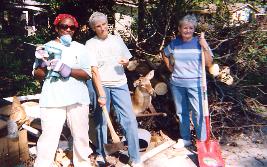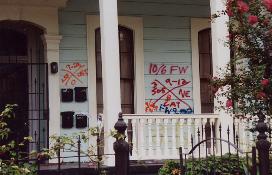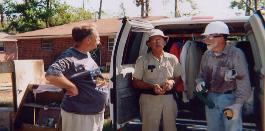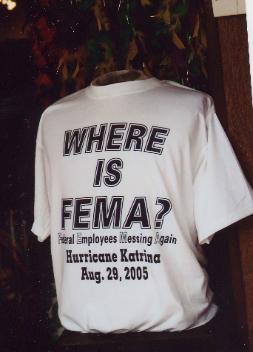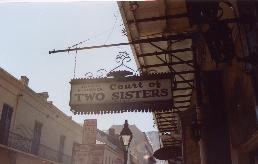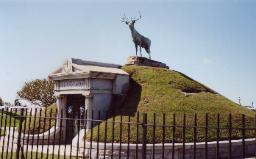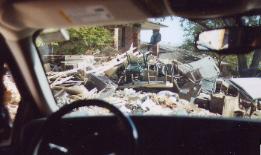Like everyone I watched the news of the victims, particularly those at the
Superdome and Convention Center, with horror and tears. And like many
people, I quickly donated to relief efforts. I was in Florida at the time and
drove back to Maryland about a week later. All the while, the conditions for
the victims were heavily on my mind.
After there was a call for volunteers at church, I didn't think long. The drive
down to Louisiana was 17 hours. I had been given some information about
what to take and had been advised to get a tenanus shot. Unfortunately, I
couldn't get a doctor's appointment in time to get the shot.
Housing was provided by the local church. On the first evening I met the other
volunteers. I worked with two married couples and another man joined us
shortly after I arrived. There were also some other people there from other
states as well as local volunteers. We were so grateful to have a group of
teenagers from Kentucky join us on two houses a few days after I arrived.
Our first job after I arrived was to clean up a local church's yard. At first, I
thought that was an unusual assignment but, after I thought about it, it made
sense. Many people had been evacuated; those still there were trying to
repair their own homes and many congregation members were elderly.
Our next big assignments were to clean out and gut houses. The smell of
mold and standing water was nearly unbearable at times. The home owners
were elderly or single older women with little means of doing it themselves.
One of the most heart-breaking experiences was to work on cleaning out and
gutting a house while its 80-year-old owner stood by, clearly headed for a
breakdown.
Insurance pays for the repairs. However, the means to clean out and gut
homes is left to the homeowner. So for the elderly homeowners, it was a badly
needed service for which people were appreciative.
One of the last homes we were to gut was that of an 82-year-old man who
rode out the hurricane and flood waters, first by breaking a window then
swimming out. He held onto his chimney for hours until a neighbor rescued him
in a small boat. His was the most tragic story. He had no apparent relatives
but by the time we arrived was living with a young man whom most people
thought was his grandson. They apparently had to deny being related in
order for the grandfather to receive aid. Tragically, we were told the aid
wasn't approved for him anyway.
Superdome and Convention Center, with horror and tears. And like many
people, I quickly donated to relief efforts. I was in Florida at the time and
drove back to Maryland about a week later. All the while, the conditions for
the victims were heavily on my mind.
After there was a call for volunteers at church, I didn't think long. The drive
down to Louisiana was 17 hours. I had been given some information about
what to take and had been advised to get a tenanus shot. Unfortunately, I
couldn't get a doctor's appointment in time to get the shot.
Housing was provided by the local church. On the first evening I met the other
volunteers. I worked with two married couples and another man joined us
shortly after I arrived. There were also some other people there from other
states as well as local volunteers. We were so grateful to have a group of
teenagers from Kentucky join us on two houses a few days after I arrived.
Our first job after I arrived was to clean up a local church's yard. At first, I
thought that was an unusual assignment but, after I thought about it, it made
sense. Many people had been evacuated; those still there were trying to
repair their own homes and many congregation members were elderly.
Our next big assignments were to clean out and gut houses. The smell of
mold and standing water was nearly unbearable at times. The home owners
were elderly or single older women with little means of doing it themselves.
One of the most heart-breaking experiences was to work on cleaning out and
gutting a house while its 80-year-old owner stood by, clearly headed for a
breakdown.
Insurance pays for the repairs. However, the means to clean out and gut
homes is left to the homeowner. So for the elderly homeowners, it was a badly
needed service for which people were appreciative.
One of the last homes we were to gut was that of an 82-year-old man who
rode out the hurricane and flood waters, first by breaking a window then
swimming out. He held onto his chimney for hours until a neighbor rescued him
in a small boat. His was the most tragic story. He had no apparent relatives
but by the time we arrived was living with a young man whom most people
thought was his grandson. They apparently had to deny being related in
order for the grandfather to receive aid. Tragically, we were told the aid
wasn't approved for him anyway.
The devastation of the North Shore area and New Orleans was stunning.
The destruction was less than democratic in that some parts of New Orleans
and the North Shore cities were virtually unscathed while others were
completed destroyed or submerged. The French Quarter was relatively
spared; however, while we were there, the city had not yet resumed trash
collection. The smell of decaying trash was sickening. I nearly threw up.
In neighborhoods which had been submerged, we passed house after house
in which everything in the house had to be thrown out. It was mind-boggling
to go down street after street in which there were piles of furniture, clothing,
dry-wall of gutted houses. Mold and bacteria-infested water had destroyed
everything from dry wall to canned food.
Sadly, we also passed cemeteries which had been flooded. As you may
know, bodies are not buried in New Orleans but entombed above ground.
You can imagine the effects on human remains after the flood waters
receded. It was hard to keep a dry eye listening to people wonder if the
resting places of deceased family members still existed.
The frustration and appreciation of local residents for government agencies
and national charities was clear and evident. FEMA and the Red Cross were
considered by many residents with some distain. In the north shore areas we
visited, in the parking lots of closed strip malls, donated clothing was piled up.
The clothes were piled there, open to the elements and there were few takers
while we were there. I was cheered to see the familiar sign of the Salvation
Army which, some six weeks after the hurricane, was still operating a mobile
kitchen. While we worked in the neighborhoods, a Red Cross van patrolled
distributing food and drinks. Although by the time I arrived, many services
and businesses, such as restaurants and grocery stores, had been restored,
there were people who were homeless, living in makeshift tents, and it wasn't
unusual for people to be unable to afford replacing their personal effects,
buying food and paying skyrocketing rents at rental housing that was left.
The most disturbing thing about the disaster's aftermath is to listen to
politicians and "religious" leaders try to rationalize the disaster. Some have
called it God's punishment and otherwise. In disasters like this, I remember
the quote of Anthony Perkins as he lay dying of AIDS, "Some say God sent
AIDS to punish and teach people a lesson. I say God sent AIDS to teach
people compassion." Compassion has been the greatest lesson I've learned
from Katrina.
The destruction was less than democratic in that some parts of New Orleans
and the North Shore cities were virtually unscathed while others were
completed destroyed or submerged. The French Quarter was relatively
spared; however, while we were there, the city had not yet resumed trash
collection. The smell of decaying trash was sickening. I nearly threw up.
In neighborhoods which had been submerged, we passed house after house
in which everything in the house had to be thrown out. It was mind-boggling
to go down street after street in which there were piles of furniture, clothing,
dry-wall of gutted houses. Mold and bacteria-infested water had destroyed
everything from dry wall to canned food.
Sadly, we also passed cemeteries which had been flooded. As you may
know, bodies are not buried in New Orleans but entombed above ground.
You can imagine the effects on human remains after the flood waters
receded. It was hard to keep a dry eye listening to people wonder if the
resting places of deceased family members still existed.
The frustration and appreciation of local residents for government agencies
and national charities was clear and evident. FEMA and the Red Cross were
considered by many residents with some distain. In the north shore areas we
visited, in the parking lots of closed strip malls, donated clothing was piled up.
The clothes were piled there, open to the elements and there were few takers
while we were there. I was cheered to see the familiar sign of the Salvation
Army which, some six weeks after the hurricane, was still operating a mobile
kitchen. While we worked in the neighborhoods, a Red Cross van patrolled
distributing food and drinks. Although by the time I arrived, many services
and businesses, such as restaurants and grocery stores, had been restored,
there were people who were homeless, living in makeshift tents, and it wasn't
unusual for people to be unable to afford replacing their personal effects,
buying food and paying skyrocketing rents at rental housing that was left.
The most disturbing thing about the disaster's aftermath is to listen to
politicians and "religious" leaders try to rationalize the disaster. Some have
called it God's punishment and otherwise. In disasters like this, I remember
the quote of Anthony Perkins as he lay dying of AIDS, "Some say God sent
AIDS to punish and teach people a lesson. I say God sent AIDS to teach
people compassion." Compassion has been the greatest lesson I've learned
from Katrina.
This page is maintained by Victoria Pilate. Comments and suggestions can be sent to vpilate[at]victoriapilate.com.
This page downloaded from <URL:http://www.victoriapilate.com/katrina.html/>
This page downloaded from <URL:http://www.victoriapilate.com/katrina.html/>
| Hurricane Katrina Relief Work |
October 2005
